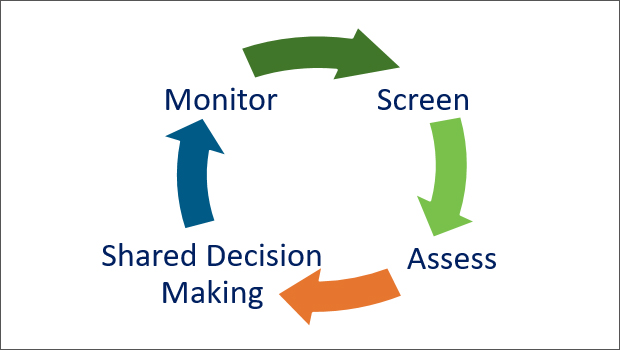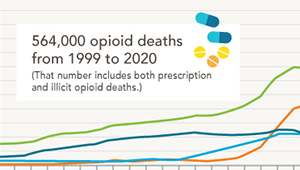Addictions
Research overview
Kaiser Permanente Washington researchers are exploring how to improve prevention and treatment of health issues due to alcohol and other drug use. The addictions research group conducts innovative research to help patients and their providers prevent and treat problems caused by alcohol, cannabis, opioids, and other drugs in health settings.
A major focus of the addictions research group is how to integrate patient-centered care for alcohol and other drug use into medical settings. For more than 3 decades, their work has focused on the need for health systems to routinely measure and address alcohol and other drug use as part of whole-person health, in nonjudgmental, patient-centered ways.
"Our alcohol-related research has built tools — such as a brief video, handout, and a patient decision aid — that help overcome stigma so that patients and families can find the help they want and need," said Katharine A. Bradley, MD, MPH, a senior investigator at Kaiser Permanente Washington Health Research Institute (KPWHRI) and internal medicine physician with Washington Permanente Medical Group.
The addictions research group is conducting a variety of studies to improve measures and documentation of substance use in the medical record. "We are working to find ways to easily document the extent of cannabis exposure for both medical and nonmedical use in electronic health records," said Gwen Lapham, PhD, MSW, a KPWHRI assistant investigator. Finding innovative ways to provide treatment is also a focus. "We are testing how to get proven online treatments for addiction into the hands of patients who could benefit," said Joseph E. Glass, PhD, MSW, a KPWHRI associate investigator whose research at the institute is funded in part by an early-career award to study the effectiveness of treatments for alcohol use disorders in primary care.
These are among the group’s current studies:
- PRimary Care Opioid Use Disorders (PROUD) is an implementation trial testing collaborative care for opioid use disorders.
- Digital Treatments for Substance Use Disorder (DIGITS) is a trial of strategies to implement online substance use disorder treatments into primary care.
- The DIGITS Equity trial is evaluating strategies to improve equity in the use of online treatments for substance use disorders among patients.
- The More Individualized Care: Assessment and Recovery through Engagement (MI-CARE) study is a pragmatic trial testing the effectiveness of a primary care collaborative care program for co-occurring opioid use disorder and depression.
- Dr. Bradley and Associate Biostatistics Investigator Jennifer F. Bobb, PhD — in collaboration with KPWHRI affiliate Kevin Hallgren, PhD, at the University of Washington — are demonstrating the psychometric validity and reliability of a DSM-5 Alcohol Symptom Checklist and Substance Use Symptom Checklist — practical tools for primary care.
- Associate Investigator David S. Carrell, PhD, is leading the Implementing Routine Screening for Cannabis and Other Drug Use Disorders in Primary Care study. Funded by the National Institute on Drug Abuse, this randomized pragmatic trial is evaluating the impact of screening on drug use disorder diagnosis and treatment in 22 Kaiser Permanente Washington clinics.
These are among the studies that the addictions research group has completed:
- The Sustained Patient-centered Alcohol-related Care (SPARC) trial found that implementing integrated mental health in primary care improved sustained implementation of evidence-based alcohol-related care.
- The Medical Cannabis Study explored patterns of medical cannabis use among primary care patients through electronic health record (EHR) and survey data.
- Dr. Lapham partnered with Kaiser Permanente Washington Mental Health and Wellness leaders to design and pilot implementation of evidence-based care for substance use into adolescent primary care.
- In collaboration with Emily Williams, PhD, MPH, a KPWHRI affiliate investigator at Veterans Affairs Puget Sound Health Care System, KPWHRI researchers found that patients with unhealthy alcohol use who had HIV were less likely to receive evidence-based alcohol-related care than those without HIV.
- The Choosing Healthier Drinking Options in Primary Care (CHOICE) trial found that, with nurse care management, collaborative care for patients with high-risk drinking raised their engagement in alcohol-related care — but did not decrease heavy drinking or related problems. However, usual care may have had benefits for patients with high-risk drinking but without symptoms of alcohol use disorders.
- The Options study developed a patient-centered decision aid for thinking about drinking and learning about options for making changes in drinking. This is now provided as a resource by the National Institute on Alcohol Abuse and Alcoholism in its Core Curriculum for medical providers.
Sparc trial tools
Resources for behavioral health integration
The SPARC trial successfully implemented behavioral health care into primary care. On our website, you can access tools for behavioral health integration, as well as frequently asked questions and publications.
Recent Publications on Addictions
Steel TL, Matson TE, Hallgren KA, Oliver M, Jack HE, Berger D, Bradley KA. Incidence of hospitalizations involving alcohol withdrawal syndrome in a primary care population. JAMA Netw Open. 2024;7(10):e2438128. doi: 10.1001/jamanetworkopen.2024.38128. PubMed
Mogk J, Idu AE, Bobb JF, Key D, Wong ES, Palazzo L, Stefanik-Guizlo K, King D, Beatty T, Dorsey CN, Caldeiro RM, Garza McWethy A, Glass JE. Prescription digital therapeutics for substance use disorder in primary care: mixed methods evaluation of a pilot implementation study. JMIR Form Res. 2024;8:e59088. doi: 10.2196/59088. PubMed
Williams EC, Matson TE, Hallgren KA, Oliver M, Wang X, Bradley KA. Assessing substance use disorder symptoms with a checklist among primary care patients with opioid use disorder and/or long-term opioid treatment: An observational study. J Gen Intern Med. 2024;39(12):2169-2178. doi: 10.1007/s11606-024-08845-0. Epub 2024 Jul 1. PubMed
Ellis RL, Hallgren KA, Williams EC, Glass JE, Rhew IC, Oliver M, Bradley KA. Prevalence of alcohol use disorders documented in electronic health records in primary care across intersections of race or ethnicity, sex, and socioeconomic status. Addict Sci Clin Pract. 2024;19(1):61. doi: 10.1186/s13722-024-00490-6. PubMed
Bobb JF, Idu AE, Qiu H, Yu O, Boudreau DM, Wartko PD, Matthews AG, McCormack J, Lee AK, Campbell CI, Saxon AJ, Liu DS, Altschuler A, Samet JH, Northrup TF, Braciszewski JM, Murphy MT, Arnsten JH, Cunningham CO, Horigian VE, Szapocznik J, Glass JE, Caldeiro RM, Tsui JI, Burganowski RP, Weinstein ZM, Murphy SM, Hyun N, Bradley KA. Offering nurse care management for opioid use disorder in primary care: Impact on emergency and hospital utilization in a cluster-randomized implementation trial. Drug Alcohol Depend. 2024;261:111350. doi: 10.1016/j.drugalcdep.2024.111350. Epub 2024 Jun 10. PubMed
Researchers in Addictions
 Jennifer F. Bobb, PhDAssociate Biostatistics Investigator |
 Katharine A. Bradley, MD, MPHSenior Investigator |
 Joseph E. Glass, PhD, MSWAssociate Investigator |
 Clarissa Hsu, PhDAssociate Investigator |
 Gwen Lapham, PhD, MPH, MSWAssistant Investigator |
 Jennifer B. McClure, PhDDirector, Investigative Science |
 Julie E. Richards, PhD, MPHAssistant Investigator |
 Paige D. Wartko, PhD, MPHSenior Collaborative Scientist |
 Yu-Ru Su, PhDAssociate Biostatistics Investigator |
 Leah K. Hamilton, PhDSenior Collaborative Scientist |
 Noorie Hyun, PhDAssociate Biostatistics Investigator |
 Jess Mogk, MPHCollaborative Scientist |
 Morgan Justice, MACollaborative Scientist |
 Theresa E. Matson, PhD, MPHCollaborative Scientist |
Affiliate researcher in addictions
Kevin Hallgren, PhD
Associate Professor
Department of Psychiatry and Behavioral Sciences
University of Washington
Emily Williams, PhD, MPH
Investigator
Health Services Research & Development
VA Puget Sound Health Care System
Edwin Wong, PhD
Associate Professor
Department of Health Services and Population Health
University of Washington














